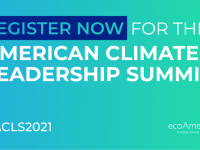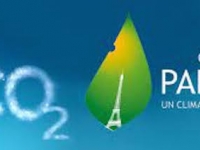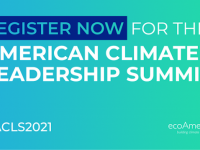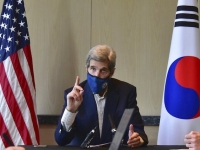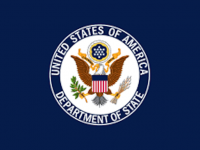Politics
PREVIEW OF U.S PDT JOE BIDEN´S LEADERS VIRTUAL SUMMIT ON CLIMATE
TO BE HELD 22-23 ARIL2021
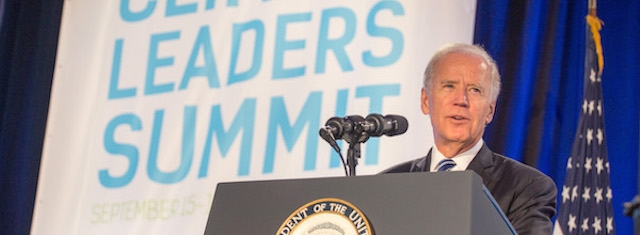
US President Joe Biden over Cilmate Summit (Source: White House)
USPA NEWS -
On March 26, President Biden invited 40 world leaders to participate in the virtual Leaders Summit on Climate, which will take place April 22 and 23, 2021. The Summit will underscore the urgency ““ and the economic benefits ““ of stronger climate action. It will be a key milestone on the road to the United Nations Climate Change Conference (COP26) this November in Glasgow. As the U.S. government reenters the global climate“¯fight, President Biden is convening this summit to ensure close coordination with key players in the international community at the highest levels of government.“¯“¯This summit is aimed at setting the world up for success on multiple fronts as we work to address the climate crisis, including emissions reductions, finance, innovation and job creation, and resilience and adaptation. “¨“¨The Senior Administration officials discuss the objectives of this Summit and answer questions from journalists." We publish the full transcript. Source: Public Affairs Officer | Office of Policy and Public Outreach U.S. Department of State Bureau of Oceans and International Environmental and Scientific Affairs
THE WASHINGTON FOREIGN PRESS CENTER, WASHINGTON, D.C. (Virtual)-------------------------------------------------
MODERATOR: Good morning, everyone. Welcome to the Washington Foreign Press Center´s virtual briefing. I´m [Moderator], and I´m pleased to welcome our two briefers, who will offer a preview of President Biden´s Leaders Summit on Climate. This briefing will be on background and comments made by our two briefers today will be attributed to senior administration officials. President Biden invited 40 world leaders to participate in this virtual Leaders Summit on Climate, which will take place tomorrow and Friday, April 22nd and 23rd. The President is convening this summit to ensure close coordination with key players in the international community at the highest levels of government. The summit will underscore the urgency and the economic benefits of stronger climate action and will be a key milestone on the road to the United Nations Climate Change Conference this November in Glasgow.
Our briefers will provide opening remarks with a preview of the goals of the summit and then we will open it up for questions. A quick review of the ground rules. This briefing is on background and we will post the transcript on our website, fpc.state.gov, as soon as it is available. If you publish a story as a result of this briefing, we kindly ask you share a link to your story by sending us an email at dcfpc@state.gov. During Q&A, if you have a question, please, go to the participant field and virtually raise your hand. If you are called on to ask your question, we will unmute you and request you turn on your camera. If you wish to be on camera the entire briefing, please, turn it on now. And lastly, if you have not already done so, please, go ahead and rename your Zoom profile with your full name and the name of your media outlet so we can know who is asking questions.
And with that, I will turn it over to our first senior administration official.
SENIOR ADMINISTRATION OFFICIAL ONE: So thanks very much, [Moderator], and thanks to everyone for joining us for this briefing. Really appreciate your time and look forward to the questions we´ll have after I make some brief opening remarks.
This is a really significant event, but I think it needs to be taken in context. This is a moment in time for an incredibly urgent problem, the problem of climate change. President Biden and the administration have centered climate change as part of our own domestic policy, as part of our international policy. We see the consequences of this agenda as both being significant to ourselves, but to the world, and we think that this is a moment where we really have to be acting with urgency.
The summit is a commitment that the President made at the very beginning of the administration. He, as you know, on the very first day of the administration rejoined the Paris Agreement, and that signing and the re-intent to join is a mark, I think, of his commitment to the agenda and of our commitment as a nation to moving forward with the rest of the world to solve this critical problem.
THE SUMMIT HAS A NUMBER OF KEY OBJECTIVES INCLUDING GLOBAL SUSTAINABLE OPPORTUNITIES----
« The summit has a number of key objectives. Perhaps most significant among the objectives is to help move forward on ambition. How do we think about ambition? Well, usually we think about it in the context of what we´re trying to do in avoiding the worst damages of climate change. The science is quite clear. What it tells us is that if we´re to seek to avoid those damages, we need ““ rapidly ““ to reduce the emissions that are leading to a rise in temperature. We know that at 2 degrees the consequences are significant, and the most recent science coming out of the Intergovernmental Panel on Climate Change suggests that we really should focus on holding the temperature increase to 1.5 degrees. We´re not yet on that trajectory, and part of what the intent for this summit is, is to raise ambition. We´ll bring our own nationally determined contribution, or NDC, to the table, but we´re looking for others to also raise their ambition.
The United States is responsible for just under 15 percent of global emissions, but that means that the rest of the world collectively has an 85 percent share. It doesn´t mean we don´t have to act. We clearly do, and we are under our administration. But it also means the rest of the world has to raise ambition. And the point of the summit is to galvanize that action, to bring people to the table to talk about what is possible and how we can move forward.
We can solve this crisis, but only if we work together. Confronting it requires an unprecedented level of additional cooperation as well as a sense of shared urgency and ambition. And of course, this is just the first stop. The idea here is not that we´re going to end up with an answer at one moment in time; we´re going to have a process over this year and following for the implementation of programs, for the raising of additional finance, for commitments on how we better adapt to the climate crisis. All of that will be part of the conversation.---------------------------------------------------------------------------------
But it´s also an opportunity. We need to be very clear that the alternative here is not one that does not lead to benefits ““ leads to benefits around the world. There are new jobs in multi-trillion-dollar markets for new energy and new innovation. There are opportunities for global arrangements that will improve the quality of life because air will be better, water will be cleaner, forests will be protected, biodiversity will be sustained. These kinds of things will improve lives for everyone, including the United States, but globally. And that opportunity is one that we want to seize. Moving forward with ambition doesn´t mean moving forward with less; it means moving forward differently, moving forward more constructively, moving forward more sustainably. So we want all countries to move forward, and the first session really is focused on that. It´s a reconvening of the Major Economies Forum. It´s a structure in which the largest countries in the world ““ those also with the largest emissions in the world ““ will be coming together again. It´s a mechanism that we have used prior to this, started by the United States quite a number of years ago. It lapsed in the last four years. President Biden is proposing to reinvigorate this major economies structure. Collectively, these countries are responsible for between 75 and 80 percent of global emissions, and the mitigation agenda therefore will require their active participation and engagement. »
THERE WILL BE A SESSION ON FINANCE---------------------------------------------------------------------------------------------
« We´ll have a session, then, on finance. It´s very clear that the finance conversation is part, and a core part, of the solution. Historically, people have often talked about finance in the context only of money is coming from donor countries through national government programs. Foreign direct investment is a somewhat separate matter. But it´s much larger. That foreign investment includes private capital. It includes asset management. It includes structures of insurance and pension funds and sovereign wealth funds. Those are structures measured in the trillions of dollars, and we need not only to move public finance, but those private financial institutions have to come to the table and orient their investment to a clean and low-carbon future. We´ll be bringing both sides to the table. We´ll hear comments from states and their national agendas, and we´ll also hear comments and recommendations and suggestions from the private sector.---------------------------------------------------------
We´ll then have a series of conversations that look at the issue of innovation. How do we solve this problem? In many cases, we know ““ we know that we can work on renewable energy; we know that if we stop cutting down the forests of the world, we will make significant progress; but we also know that we need to reduce the cost of some of these new technologies to make them available and accessible globally. Can we bring the price of batteries down so the cost of an electric vehicle is within reach? Can we improve the quality of agricultural management so that we can actually use less water and the soil can retain more carbon? How do we think about innovation in the area of city management so we can be more efficient and effective at managing the way people live and the buildings that people have? All of these are part of an innovation discussion and we´ll have that discussion as well. And then we´ll close ““ we´ll close with a discussion that will focus on jobs and the transition. We know that jobs are going to be at the heart of a sustainable and effective solution to the climate question. And this brings me very much back to the opportunity agenda. We see huge opportunity in this shift, something President Biden has made clear. We see it for the U.S. but we also see it globally. We see opportunities in new arenas that we have not yet explored. We see new retraining requirements and skilling needs, but we also see enormous numbers of opportunities in jobs and employment."
A SERIES OF MINISTERIAL LEVL SESSIONS FOCUSING ON ADAPTATION OVER CLIMATE AGENDA--------------
« We´ll have a series of other sessions at a ministerial level that will focus on adaptation. This is going to be key for building resilience and building security in our system. We´ll have a focused session on nature-based solutions, the land and the forests and the oceans and how we both protect them and deploy the assets that the nature system ““ natural systems ““ bring to our collective climate agenda. And then we´ll have a conversation on subnational entities ““ not just national government but subnational entities like states and like cities really trying to drive the agenda forward. Not all policy is national. A great deal is local. And then we´ll have a session on climate and security. This is ultimately a security question. This is a security of nation, it´s a security of people, it´s a security of assets. If we don´t manage it well, the droughts and the floods and the consequences for disease will all run rampant. How do we increase the global security of the community?
We´ve had remarkably good and high-level interest in this session. We´re inviting about 40 heads of state. As of now, all of them are confirmed. We will see them virtually. This is a virtual session. Partly because of the time zone, it will run over two days as opposed to a single day. It will start off on the 22nd in the morning and will have really a significant opening session with heads of state from the major economies coming forward and speaking, followed by the finance session and then the ministerial sessions that will look at adaptation, nature, subnational entities, and security. And then on the second day we´ll open with innovation and follow that with some work on jobs and the transition."
Let me stop with that and take some questions and turn it back to [Moderator].
ENORMOUS VALUE TO THE ENVIRONMENT IN THE TREE PLANTING AGENDA------------------------------------------
MODERATOR: Thank you so much. Yes. Our other official unfortunately got called away and is unable to participate, so we will move right “”
STAFF: [Moderator], I´m sorry to interrupt you. I believe our other official has joined us.
MODERATOR: Oh, wonderful, wonderful. Then please, go ahead.
STAFF: She messaged me that she was in the waiting room. I´m not sure if she´s already been admitted.
MODERATOR: All right, one moment. No one´s in the waiting room.
SENIOR ADMINISTRATION OFFICIAL TWO: Hi, I´m just ““ I got back in. Thank you so much.
MODERATOR: Oh, wonderful. Great. I´m so glad you were able to join us. Please, go ahead.
SENIOR ADMINISTRATION OFFICIAL TWO: Sorry, is there a question to respond to? I know ““ I was just ““ I heard that [Senior Administration Official One] was speaking.
MODERATOR: Oh, no, we were just working ““ sorry, we were just doing opening statements. Our first administration official made some opening remarks, and I wanted to give you an opportunity to make any remarks, if you wish, before we move into question and answer.
SENIOR ADMINISTRATION OFFICIAL TWO: Great. I think that [Senior Administration Official One] covered both the agenda and the current posture of the administration, so I would be hesitant to repeat what he has already said given that I was in ““ I was stuck in the other room. So if you get to question and answer, I can always come up and pick up where he may have left off.
MODERATOR: Okay. All right. So then we can just move on to our first question, then. Our first question will go to Raquel Krahenbuhl from TV Globo. Go ahead, Raquel. You´re unmuted, Raquel. You can please go ahead.
All right, I think we´re having some trouble. We´ll come back to Raquel and we´ll go to our next question, which will be Jose Diaz-Briseno. Go ahead.
QUESTION: Hello. Can you “”
MODERATOR: Yeah, we hear you. Go right ahead. Thank you.
QUESTION: Thank you so much. The president of Mexico has said that his main proposal during the coming summit will be for the U.S. to finance a tree-planting program in Central America that allows participants to request the U.S. citizenship. What do you think of this proposal?-----------------------------------------------------------------------------------------------------------
SENIOR ADMINISTRATION OFFICIAL ONE: Thanks. Let me take a first cut at that and then our other colleague might want to add something to it. So we just recently heard about it. It does not sound like it´s one that has had a chance for an extensive conversation, either in Mexico or between Mexico and the United States. I think there are two parts to it. The first is the issue of tree planting. In that context, we definitely see value in the natural-based solutions that are brought from the tree-planting component. If we look at the climate change agenda, the issue of reforestation is very high. The better part of one-third of global emissions come from the land-use sector. That includes the forestry sector; also the agricultural sector and the land management ““ conversion of forests to other uses, pasture land to other uses. So there´s an enormous value to the environment in that tree-planting agenda.We, however, are not focused on the intersection between issues. To us, the climate agenda needs to be taken on its own, on its own merits and moving it forward, and this is not a conversation for us about immigration. It´s a conversation about climate change. QUESTION: Thank you."
THE USA AND CHINA´S AMBITIOUS AGREEMENT TO MEET CLIMATE EXPECTATIONS--------------------------------
MODERATOR: Great, thank you. For our next question we´ll go to Owen Churchill. Please, unmute yourself and provide your media outlet before asking a question. Thank you.-----------------------------------------------------------------------------------
QUESTION: Hi there. Thank you. I´m with the South China Morning Post out of Hong Kong. I ““ a couple of quick questions. You mentioned the need for the rest of the world, apart from the U.S., to step up its ambition, and I wondered if you could elaborate a bit on administration expectations or hopes when it comes specifically to China and what you hope to see in terms of any new commitments or announcements from them.---------------------------------------------------------------------
And then secondly, I wonder if you could elaborate a bit on the decision not to hold any bilaterals during the summit. Is it ““ was it purely down to the ““ to the fact that this is a virtual summit? And are you at all concerned that that might hinder your ability to kind of ““ to dig deeper with certain countries about some of the issues that they face? Thanks.------------------------
SENIOR ADMINISTRATION OFFICIAL TWO: I´m happy to start there and then turn it over to [Senior Administration Official One]. In terms of the decision not to hold any bilaterals, this is really more of a technical challenge than anything else. We are really pleased to be welcoming 40 heads of state to what is probably the largest gathering ““ it is the largest gathering virtually by the U.S. focused on climate change, and to pull all these players together as well through the translation components that we are offering. This is really technologically ““ we´re really excited to be able to do this and host this. But the idea to then have separate Zoom rooms or breakout rooms, even as sort of pull-asides as you would in a live session, was just not possible, especially given also the time zone challenges that we´re facing.----------------------------------------------------
So as you know, we are starting the summit at 8:00 a.m. both mornings with the hope to try to accommodate as many global participants live and in person as possible but recognizing this is quite late for many countries around the world, and so really want to make sure that we were able to accommodate that. And so that was part of the decision behind not having any actual bilaterals because we really want the leaders to be committed to being there as much as possible for the two days across the various leader-level sessions that my colleague had mentioned at the top of this call.-------------------------------------
In terms of hindering our progress, in fact, it´s actually quite the opposite. If you were to ask us a hundred days ago how many leaders would be coming to a voluntary virtual summit focused solely around raising climate ambition and how we´re going to address climate, particularly in this decisive decade, I don´t know if you would say that we would have had this type of wide reception or, frankly, the number of conversations that we´re already having and underway with several countries around the world about what they plan to do to enhance their ambition and increase their ambition through this year and to set targets and commitments before the end of the decade to really be able to mobilize and move faster and quicker now in the 2020s, then rather wait till after 2030 to take action. So really excited that this summit and this platform has given us this opportunity to hear from and to engage directly and early in the administration with over ““ with, frankly, countries around the world.------------------------------------------------------------------------------------------------------------------------------------------------
In part of the outreach for this summit, it´s worth noting that we actually reached out through our State Department to all embassies and posts around the world to highlight what the President has done to focus on climate change ““ not only what we did on day one, which was rejoin the Paris Agreement, but frankly, what we´ve done every day since day one, whether it´s the next executive order that happened on January 27th or the bilaterals with Canada and Mexico, the Quad summit with India, Australia, Japan, and the U.S., or even last week with the first in-person visit ““ state visit with Prime Minister Suga. This is something that globally has been atop on the agenda for discussions, and the summit has been serving as a great accelerant and a catalyst to have these conversations.----------------------------------------------------------------------------------------------------
In terms of coming out of the summit, as my colleague mentioned, we´d focus on these four ““ six thematics, frankly: nature-based solutions, action at all levels, raising ambition, finance, innovation and technology, economic opportunity and job creation. Those themes are actually themes that are going to help capture and encompass many of our bilateral framing and relationships coming out of the summit. And we´re using the summit as ““ really, as we have mentioned, a starting point on this road to Glasgow. And as a starting point, the sort of ““ the beginning of this journey for really global leadership-led ““ global leadership by the United States on climate, this is about beginning these conversations with key countries around the world, using the summit as an opportunity to start to have these difficult conversations in times, and frankly, the conversation of how we advance and accelerate.So we´re looking forward to sharing with you over the next two days announcements and lifting up announcements from some of our partner countries showcasing and joining forces and partnership with several different countries on particular themes to the summit and really be able to accelerate that going forward.And then I´ll just let [Senior Administration Official One] talk ““ and regarding China, I guess I´ll just give a quick opening on China and then turn to [Senior Administration Official One] on the China to respond to that. Really excited about ““ after the trip that Secretary Kerry ““ and [Senior Administration Official One] can speak more about that ““ really have an opportunity here to be featuring the full set of major emitting countries, including China, including India at the summit through the opening session focused on the major emitters. It´s really critical to us that we have the 80 percent of global emissions, 8 percent of GDP, be able to address what we can be doing to tackle the climate crisis, both individually, but also collectively.
And so I´ll turn to [Senior Administration Official One] for further details.-------------------------------------------------------------
SENIOR ADMINISTRATION OFFICIAL ONE: Yeah, only one very brief point. [Senior Administration Official Two] has broadly opened up the framing that I think is correct. We are expecting people to come and talk about the ambition that we need to see to move the agenda forward. In the most recent ““ you perhaps had a chance to see the statement that was released following the trip that Secretary Kerry had with his counterpart, Minister Xie Zhenhua of China. Following that trip, it´s quite clear that there is a distinctly shared level of ambition.Both countries see this as a crisis. Both countries see the need for action in the 2020s. Both countries see the need to work towards holding the increase in global temperatures to 1.5 degrees. Both countries see the need to develop long-term strategies to get to zero ““ to net zero and carbon neutrality by the middle of the century. Both countries see the need to work in individual areas to promote that. That means energy. That means land use. That means non-CO2 gases like methane. That means work on issues like renewable energy, but it also means work in industrial activities and work in transportation.
It´s an inclusive agenda. We certainly hope that President Xi will come to the meeting and further elaborate on some of the additional efforts that China would choose to make. But I think we´ve got a very strong basis in the joint statement that the two countries made about the directions they seem to be moving. Thank you.----------------------------------------------------------
MODERATOR: Thank you both. For our next question, we´ll go to Marina Dias. Please unmute yourself and let them know your country and outlet. Thank you"
BRAZIL´S DEFORESTATION UNTIL 2030-------------------------------------------------------------------------------------------------
QUESTION: Hello. Can you hear me?
MODERATOR: Yeah, we hear you.
QUESTION: Okay. I´m Marina Dias from Folha de Sao Paulo, a Brazilian newspaper. So the United States is calling for concrete measures to reduce the first station in Brazil so the country can deliver results this year. Brazilian President Jair Bolsonaro will give a generic speech tomorrow saying that he could increase enforcement over deforestation and also ““ and illegal deforestation until 2030, but he could do more if he has money from rich countries. So is that ambitions enough? Is there a number that ““ does Brazil have to reach this year in terms of decrease deforestation, in your view? Thank you.
SENIOR ADMINISTRATION OFFICIAL ONE: Maybe I´ll start with that one. Thank you so much.
The expectation for all countries is that the ambition has to be increased immediately. It´s not, I think, a luxury that we´ve got to wait a decade before we start. It certainly applies to the energy sector, it applies to the land use sector, it applies broadly. The idea of waiting is not consistent with the idea of trying to keep the global damages down. To do that, we think we have to hold the opportunity to get to 1.5 degrees, and the only way you can do that is with immediate and near-term and scaled action.--------------------------------------------------------------------------------------------------------------------------------------
We understand that the president of Brazil has been considering next steps, particularly on the deforestation agenda. In our own conversations with our Brazilian counterparts, we have really expressed a very strong interest in seeing immediate action: halting illegal deforestation, moving forward on commitments to engage with indigenous and local communities ““ because part of the problem is never only at the national level, it´s often a local conversation that will solve things ““ and putting resources into compliance. It is clear that there´s going to be some global engagement with Brazil on that agenda. It´s not a question of saying everyone´s on their own. It´s a question of saying how do we collaborate and cooperate to move more quickly. But ultimately for many countries, if they´re not acting on their own and moving forward on their own, it´s very hard for the global community to engage. We certainly hope that in Brazil´s case, both will be reflected: a commitment to move forward, a commitment to improve compliance and enforcement, and then a consideration of how international collaboration might help. Thank you."
AUSTRALIA IS GOING TO HAVE A BIG SHIFT OVER NET ZERO EMISSIONS BY MID CENTURY-----------------------
MODERATOR: Okay, thank you. Next we´ll go to Barbara Miller. If you can go ahead and unmute yourself and identify your country and outlet. Thank you.-----------------------------------------------------------------------------------------------------------
QUESTION: Thank you. Barbara Miller, Australian Broadcasting Corporation. Secretary Kerry said a couple of months ago that he didn´t feel that the U.S. was on the same page as Australia, or vice versa, Australia was on the same page as the U.S. Is that still the case? And what, in concrete terms, might you expect from Australia in terms of an increased ambition?
And on that point, when can we expect to get some details on what we understand to be an increased NDC from the U.S.? What´s the timing on that? Thank you.--------------------------------------------------------------------------------------------------------
SENIOR ADMINISTRATION OFFICIAL ONE: So maybe I´ll start and we can get some additional feedback. The open question for Australia, which has been ““ as you know very well, has been a very difficult political conversation in the country about how much ambition is there, what´s the timing, how does the domestic conversation around in particular industrial activities and mining activities, not least for fossil fuels ““ how can that be made more consistent with the agenda on climate.
At the moment, I think that our colleagues in Australia recognize that there´s going to have to be a shift. It´s insufficient to follow the existing trajectory and hope that they will be on a course to deep decarbonization and getting to net zero emissions by mid-century.------------------------------------------------------------------------------------------------------------------------------------
I think the differences are very largely about what the trajectory is and how do you get on it. One view of the world says, “Don´t worry, technology will solve the problem.“ The other view of the world says, “At the end of the day, technology will contribute but is insufficient on its own to solve the problem, and you have to have a set of policies, you have to have national intent, you have to follow up with actions and commitments.“----------------------------------------------------------------------------
I think that there´s movement. What we are certainly seeing is statements from Prime Minister Morrison making clear that he sees both. We are hopeful he will come to the summit and make announcements around both and commit the country to next steps that we think would be critical. We certainly see them as a strong ally, an ally in technology development, but also an ally in the opportunities for policy development. There´s an enormous well of innovative programming that happens at the national level as well as the subnational level in Australia. They´re a key player in the region and can make major contributions to other countries in the Pacific. We see enormous potential for joint work between our two countries and have a long history of cooperation.-------------------------------------------------------------------------------------------------------------------
I think the question of what they do and what they say will certainly affect how and how effectively we can cooperate going forward, but we see potential here for something substantial and are looking forward to his statements to that effect. Thanks.
QUESTION: Thank you. Sorry, can I just pick up on that other question as to when we might expect to hear about the U.S.´s new or revised NDC?----------------------------------------------------------------------------------------------------------------------------
SENIOR ADMINISTRATION OFFICIAL ONE: So let me come back on that. The answer is stay tuned. We´re in the process of putting it together and we´ll come back to you as soon as we can with information on that.
QUESTION: Thank you.
THE EUROPEAN UNION REACHED THE AGREEMENT TO CUT EMISSION BY AT LEAT 55% BY 2030----------------
MODERATOR: Great. Thank you. For our next question we´ll go to Paolo Mastrolilli. And forgive me if I mispronounced your name. Paolo, please unmute yourself and identify your country and outlet. Thank you.----------------------------------------
QUESTION: Thank you very much for the briefing. Paolo Mastrolilli with the Italian daily La Stampa. The European just reached the agreement to cut the emission by at least 55 percent by 2030. Is that enough? Is the United States ready to do something similar? And since Italy is hosting the G20, what would you like to see in the G20 agenda in order to enhance the objective of a climate change response? Thank you.----------------------------------------------------------------------------------------
SENIOR ADMINISTRATION OFFICIAL TWO: I think I´ll take the G20 question. And again on the NDC front, we don´t want to get ahead ““ out ahead of the President on this one. And so more details to come on that, but we don´t want to be out in front regarding any of the details regarding the domestic NDC component part of this week.------------------------------------
But I wanted to say, regarding the G20, it is clear through our work on the G7 as well seeing climate change at the leader level is quite important to all of us. We think it´s really critical that ““ and particularly around the G20 countries, we have a much deeper discussion around climate finance, around the climate ambition of the partner countries in the G20, and around the role that clean energy and adaptation plays among those leaders. I think we have a ““ through the G7, we´ve got a great discussion underway. And through the Italian presidency, we expect that we will see a similar elevation of climate on that agenda. And I´ll pause there.-------------------------------------------------------------------------------------------------------------------
SENIOR ADMINISTRATION OFFICIAL ONE: And let me come to your first question. We just saw the announcement from the European Commission about the agreement on the 55 percent. I think it´s critical. There´s also ““ I´m thinking particularly about the new law that was just approved. The 55 percent obviously has been out for a little while.
As we look at the trajectory, the question for us very much has been: How can you make it consistent with getting on track to hold a temperature increase to less than two, well less than two, and to try to keep 1.5 degrees in sight alive? And that looks like it is consistent.
If we look at the modeling that has been done by the Intergovernmental Panel on Climate Change, by the OECD, by various academic institutions, this looks like it´s an appropriate and consistent level to meet that longer-term trajectory.
The question, of course, is: What are the policies and how do you move forward more immediately to implement? And that´s the next stage. Part of the new climate law that was just agreed begins to lay that out in greater detail. Individual countries are beginning to develop their own plans at a national level. Italy is certainly one of those countries, but we´re seeing it across the European community. Those will be essential, I think, to give confidence about the implementation phase of the agreement. We´re hoping that others will follow suit. I think the EU has been quite ““ very much of a leader in the process, and that´s happened over the last number of years. It´s continuing with the new law. And we look forward to the continuation of our partnership with them as we move forward to solve this crisis. Thanks.
IS JAPAN TO SPEAK WITH ONE VOICE WITH ALLIES OVER CARBON CAPTURE AND STORAGE PROGRAM ?
QUESTION: Hello. Can you hear me?
MODERATOR: Yes, we hear you.
QUESTION: Thank you for doing this. My name is Miya Tanaka. I´m with Japan´s Kyodo News Agency. So my question is: You said the Biden administration´s expectations for all countries is that the ambition has to be increased immediately. But countries like Japan are often criticized over its approach to coal, including funding coal plant overseas. So is that a matter the Biden administration particularly wants Japan to address so that it can speak with one voice with allies? Thank you-------------------------------------------------------------------------------------------------------------------------------------------------.
SENIOR ADMINISTRATION OFFICIAL ONE: So I´m happy to start with this and maybe can have a follow-up. The answer is that we don´t see an unabated intensive carbon fuel as part of the long-term solution. There isn´t any model that enables us to keep global average temperatures at 1.5 or even well below two in which there is a significant share of coal or other carbon-intensive fuel in the system.----------------------------------------------------------------------------------------------------
Now it doesn´t necessarily say no coal. It says no unabated coal. If we had a comprehensive carbon capture and storage program, and we´re able to capture all of the CO2 from coal, it would be a different story. But that currently is a technology that´s remarkably expensive, and there are many, many lower-cost options that would be much, much easier to implement.
So the question then becomes: What are the investment options for a country like Japan or others that are continuing to make investments in fossil fuel? The first note is to say that there´s actually a stranded asset that is likely coming within the next few years. As alternatives become cheaper, and as, in fact, we are seeing in almost the entire world, the price of renewable energy, even when you add in the cost of batteries for backstop, the price of renewable energy is increasingly competitive and in many cases cheaper than the price of coal, which means if you´re a utility and you´ve invested in coal, with perhaps international support, you´re going to have an asset that will not be a good performing asset. So the market is speaking quite loudly.----------------------------------------------------------------------------------------------------------------------------------------------
The second comment is that there are real alternatives and options right now, a lower carbon trajectory for investment in countries´ power sectors. We acknowledge and we recognize the really critical need that countries have for sustainable, reliable electricity. It doesn´t, however, have to be high-intensity, high carbon intensity. It can be much, much lower. And what we were urging all countries to do is to shift their investment portfolios so those high-intensity investments are phased out ““ they should be done immediately ““ and that the low alternatives, the low-carbon alternatives are put forward in their place. We see a substantial opportunity for Japan and for others in making that shift. We recognize that this requires some planning. We recognize you don´t want to do it abruptly and leave people hanging without power or capacity. We recognize there are contracts that are in place. But we also recognize the need to solve the climate crisis, and doing so is not consistent with an unabated coal trajectory. Thanks.
THE USTR AND EXCHANGES USA/UE---------------------------------------------------------------------------------------------------
MODERATOR: Thank you. For our next question, we´ll go to Alex Panetta of CBC. Alex, please go ahead and mute yourself. QUESTION: Hi. MODERATOR: I mean, unmute yourself. (Laughter.)----------------------------------------------------
QUESTION: Thank you. Thanks so much for doing this. Just wanted to ask about something that came up during the election campaign. President Biden ““ well, today we´re talking about cooperation, but during the campaign President Biden talked a little bit about an approach you might describe as carrot-and-stick. The stick part of the equation included naming and shaming countries that didn´t do their part, I guess with annual reports, perhaps, and also floated the idea of some sort of carbon adjustment fee for countries that fail to do their ““ to carry the load. So I guess I wanted to ask you when we might expect to see that stick part of the equation wielded, and what it might look like.------------------------------------------------------
SENIOR ADMINISTRATION OFFICIAL TWO: Thanks, I´ll start there with this one. So as you saw, we actually put out ““ in the Trade, the USTR ““ I think Trade put out clear language when we think about our domestic agenda and we think about our actions on climate, it involves a range of domestic action as well as working with partners and allies around the world. And I need to pull the exact language from what was in our existing sort of trade language that was put out, and I´ll get that for you in a second, but it´s clear that we are always ““ we are willing to continue to take action on our side to make sure that we are advancing our climate agenda, and we are in conversations with other countries that are moving forward with measures that do ““ that create a border adjustment in some regard. So the European Union, we have been in discussions with them and consulting with them to better understand what their process looks like and what they are considering. And we are continuing to track other countries that are exploring these types of measures to inform what the President had talked about during the campaign, which was understanding how these measures work, how they are applied, and how others are applying them. And so early in the administration, I think there was already language out there that I can share with you or we can share after the call regarding the posture around this. QUESTION: Thank you.
AFRICAN PARTICIPATION TO US CLIATE LEADERS SUMMIT OVER FOOD AND FOOD SAFETY----------------------
MODERATOR: Okay, great. Thank you. Our next question will go to Pearl Matibe. Pearl, if you can unmute yourself and identify your country and outlet, please, go ahead.------------------------------------------------------------------------------------------
QUESTION: Thank you. Thank you so very much. I really appreciate this availability. My question is ““ sorry, my outlet is Power FM 98.7 in South Africa. So my question would be, you said you´ve invited 40 countries. Who have you invited from the African continent ““ and also, given that Cyril Ramaphosa heads up the AU? If you could just me know a little bit about where do you see Africa being scaled up at the same level as the other countries in the world, and where do you see a positive narrative towards Africa playing out in job creation resilience? We´ve seen a lot of weather events in KwaZulu-Natal, Mozambique, Malawi, Zimbabwe, a lot of flooding from the cyclones. So where do you see that playing out? Where´s ““ what´s Africa´s role in this? Thank you.------------------------------------------------------------------------------------------
SENIOR ADMINISTRATION OFFICIAL: So thanks very much. Let me start, and maybe we can follow up then subsequently. We´ve invited the president, and we understand at the moment that he is planning to come. We´ll have a full list of all the invitees that you can see. And at the moment, what we understand is that all of the heads of state we´ve invited will be, in fact, joining us. I think the second part of your question, though, is hugely valuable, and thank you for raising it. As we look at the continent broadly, I think it´s been one that´s faced some of the brunt of the worst damages from climate already. You pointed out a couple in the South African context, but they´re wide-ranging across the continent. In many cases, countries that have contributed only very modestly to global emissions but are seeing some of the worst of the effects ““ even already with the fairly modest increases we´ve seen ““ some of the worst effects from climate.--------------------------------
And it´s likely to get worse, and it´s likely to get worse more quickly unless we can both reduce emissions ““ and so in some way the biggest adaptation plan we could possibly have is an effort to cut back on the emissions that are creating the problem. That would really minimize the risk. But then we really have to start working with countries about how to build resilience, how to be able to manage more effectively in the face of the threats that are being ““ that are emerging.---------------
I put them to a series of categories. There is a category of threats that are around the built environment, questions that have to do with floods that can inundate coastal areas, that can damage infrastructure. Those are things that come along in the interior with increasing severity of weather events.-----------------------------------------------------------------------------------------
There´s a second category that has to do with food and food safety and food security. These are things around the changing both of weather patterns that might lead to a reduction in productivity, but also to heat, also to pests that increasingly change the range that they´ve got within a country, and then the distribution networks that could be affected because of a shift in some of the climate consequences.There´s a third set of pieces that have to do with individual human health. We are seeing indications that in climate change scenarios, there will be days of the year in some parts of Africa where being outside ““ just being outside in an un-air-conditioned place, due to a combination of temperature and humidity, would be fatal. That´s an extraordinary thing. We think there´ll be a number of days in some parts of the world in about 2040 or 2050 where you can´t be outside and live. That´s a huge shift.-------------------------------------------------------------------------------------------------------
But even well before we get to that, the numbers of heat stroke victims, the numbers of people who are suffering from disease because vectors come out ““ we think the zoonotic disease rates are likely to increase with climate change and a change in the disease vectors. All of that is falling into that category. This is part of the reason that we think the mitigation agenda is so central.Finally, I want to come to: What could we do about that? How do we address that problem? And while I take the point of South Africa in particular that you´ve raised, it plays out more widely into countries around the world. We´ll be having a separate session as part of this summit that begins to really elevate the adaptation question. It´s a matter for both building resilience and building institutional arrangements that can cope with these kinds of damages. It´s a matter of moving finance and financial institutions to support capacity in country, but also support the new infrastructure that´s required.
We anticipate bringing to the to the meeting, and they have agreed, countries like Bangladesh, which is currently chairing the Vulnerable Countries group, the V20, countries from the small island states that see horrific and frankly existential impact on their nations. Those are countries that we are bringing really to raise the profile of the message that you´ve articulated. We see it as a central piece of awareness raising but also have the effort to build solutions, because there are answers to these questions. There are ways forward, both in the joint global community as well as in things that´s going to be happening at the national level and local and community levels that can really ameliorate the worst of these damages. So definitely a focus for us will be an increasing focus going forward. Thanks.--------------------------------------------------------------------------------------
SENIOR ADMINISTRATION OFFICIAL TWO: And I think it would just add, in terms of the summit itself and to highlight what [Senior Administration Official One] did mention about really the range of ways of opportunity and cooperation, but also the challenges that are faced, both with South Africa but also across the continent itself, on the diversity of what the opportunities are. You´ll see throughout the agenda itself we´ve got speakers from different parts around the region in almost every session, whether it was ““ the secretary of defense from Kenya will be speaking with our Secretary of Defense in one of the first ever sort of secretary of defense ministerial discussions focused on climate security. There is the head of state from ““ the President Buhari of Nigeria on the economic opportunities of climate action. This is a session really focused about the worker benefits and ensuring that all communities benefit from an energy transition, from a climate transition. And you´ll see ““ you´ll hear from him there. We also have the president of Kenya, President Kenyatta, on the unleashing climate innovation session, and then we actually have the Democratic Republic of Congo on the session around investing in climate solutions and the role that climate finance places. So we think we´ve really tried to demonstrate and showcase the range of opportunity and engagement throughout the region throughout the summit.
THE UAE IS RAPIDLY GROWING IN SOLAR PANEL DEBELOPMENT AND WATER MANAGEMENT-------------------
MODERATOR: Thank you. All right. I think we have time for one last question. We´re going to go to James Reinl. I´m sorry, I mispronounced your name, James. But please go ahead and unmute yourself and state your “”---------------------------
QUESTION: Hi there.
MODERATOR: Okay.
QUESTION: Great. You can hear me? And the pronunciation is Reinl, to sound like vinyl.
MODERATOR: Reinl, thank you. Thank you. Please, go ahead.
QUESTION: Like vinyl, like they used to make records out of. Listen, thanks so much for the briefing and thanks for squeezing me in. It´s really appreciated, because I´ve got an important question for the folks in my region, which is the Gulf. Mr. Kerry has done three trips since taking the job. One of them was to China; one of them was to India. And those are obvious no-brainers for the climate change debate. His first trip was to Abu Dhabi, and I noticed at your meeting tomorrow you´ve got attendance from King Salman of Saudi Arabia and also the prime minister of the UAE. So these countries, they are oil producers, obviously, so they´re connected to the energy sector, but they´ve got relatively small populations. And although they are big carbon emitters, they´re not ““ per capita, they´re not big in the overall picture. So why do they have a prominent role in this meeting? Why were they Kerry´s first trip? How does the oil-rich Gulf form a critical part of the climate change debate moving forward?-------------------------------------------------------------------------------------------------------
SENIOR ADMINISTRATION OFFICIAL TWO: At least ““ I´ll just start in terms of broadly why these countries are participating in the summit and why they´ve been invited. So at least broadly, from the oil rich producing nations and the Middle East region itself, first and foremost, it´s really important that this summit is not just about ““ the point of the summit is about the major emitters, but also those that are part of the major emitting and the oil producing role to the climate crisis. And it´s really critical for us to engage all the key players in this solution set at this summit, particularly focused on the major economies.The other key piece to the invitations for some of these key players is because of the role that they play in terms of the decarbonization angle to the energy transition. On that trip that Secretary Kerry was on, it was actually considered, I think, the first regional dialogue on climate change at the ministerial level for the Middle East region. And so they welcomed and invited Secretary Kerry to come, and they were able to convene the regional ““ one of the first discussions solely focused on climate, and they created a joint statement out of that, which I think is really significant because, again, it showcases that, as [Senior Administration Official One] mentioned earlier, the energy transition that´s happening is well underway, and it involves a range of stakeholders. And if we´re going to reach the one-and-a-half-degree aspirational goal that we have and that we have in mind that we know that science demands, it´s going to require particularly producing oil producing nations and others to decarbonize, to support decarbonization, to invest in many of these solutions. And so that´s one piece to that, and I´ll pause there.-------------------------------------------------------------------------------------------------------------------------------
SENIOR ADMINISTRATION OFFICIAL ONE: Let me just only add a couple of quick additions here. I think historically, many people have looked at the climate change problem and said you have to talk to the big players or you talk to the ones who are advanced and able to move quickly. Now, that leaves off a lot of the really difficult transition questions that all of us face. It doesn´t matter if you´re an Australia or a U.S. or a UAE or a Saudi Arabia. You´re going to have to figure out how you move an economy which is partially reliant on carbon intensive activities to one that is not.------------------------------------
President Biden´s made quite clear his emphasis on jobs and this notion that a transition can be good for a country. I think if we look at some of the countries in the region, that would apply to them as well. There are real opportunities and some of these countries ““ the UAE is a really good example ““ are incredibly advanced in thinking about that transition. Saudi Arabia has been doing some of the same kind of work. Currently, of course, its GDP is so heavily reliant on the oil and the oil exports, but it´s growing really rapidly in solar panel development, in installation of capacity that might move to a hydrogen economy. The UAE is leading on some of the most innovative work on the management of water.---------------------------------
These are questions to us that are going to have to be grappled with, and some of these countries which have historically been relegated to a second tier of either unimportant or problem nations, I think may be part of the solution. Bringing those solutions to the table is really part of what this summit is about. It´s essentially an agenda to raise ambition and to think about how we can collectively, globally do this transition. No one has to get left behind here. This is a conversation that should apply to everyone, and this region clearly sees a lot of the effects, some of the worst damages in the world because of climate, but also could be part of the solution. And from that, I think we really benefit, all of us, from hearing their ideas. Thanks.
MODERATOR: Great. I want to thank our two briefers for their time today to discuss this important and innovative summit. Thank you. And I want to say thank you to our journalists for your participation, and this briefing is now concluded. QUESTION: [Moderator], can you confirm that there will be a transcript?
MODERATOR: Indeed. The transcript will be posted to our website, fpc.state.gov, as soon as it´s available.
QUESTION: Thanks so much. » Source: Public Affairs Officer | Office of Policy and Public Outreach U.S. Department of State Bureau of Oceans and International Environmental and Scientific Affairs
Us Pdt Joe Biden Leaders Summit On Climate Virtual White House John Kerry Special Envoy Paris Agreement Environment World Leaders Russia China France Rahma Sophia Rachdi Jedi Foster
Liability for this article lies with the author, who also holds the copyright. Editorial content from USPA may be quoted on other websites as long as the quote comprises no more than 5% of the entire text, is marked as such and the source is named (via hyperlink).

